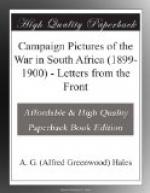He must be an excellent judge of distance, of time, of numbers. He must be able to tell at a glance whether a cloud of dust is caused by moving troops or by the action of the elements. Above all, he must be truthful, not given to exaggeration of his friends’ strength or his enemy’s weakness. When he makes his report it should need no corroboration. If a scout is worth his salt, his advice should be accepted and acted upon promptly.
I often go out with the scouts; they are the eyes of the army. A man who knocks around with scouting parties knows more, sees more, hears more of the real state of affairs than nine-tenths of the staff officers ever know, hear, or see. Men fresh from the Old Country seldom make good scouts. Take the Yeomanry, for instance. They are plucky enough, but not one in a hundred of them has the making of a scout in him. All his fathers and his grandfather’s and his great-grandfather’s breeding trends in other directions, and there is an awful lot more in the breeding of men than most folk imagine. The American makes a good scout. If he knows nothing of the life, he soon picks it up. So does the Australian, and the Canadian, and the Colonial-born South African. Something in the life appeals to them. They get the “hang” of it with very little trouble. There are some English-born men, however, who develop into rattling great scouts. These men are mostly adventurous fellows, who have roamed about the world, and had the corners knocked off them. I have two of them in my mind’s eye just at present. One of them is an Irishman named Driscoll, Captain of the Scouts who are the eyes and ears of Rundle’s army. The other is an Englishman named Davies, a captain in the same gallant little band. The first lieutenant is a Cape colonial of English extraction, named Brabant, a gallant son of a gallant general. Captain Driscoll is a typical Irishman, just such a man as the soul of Charles Lever would have revelled in, a man of dauntless daring, with a heart of iron, and a face to match. Strangely enough, the captain does not pride himself a bit on his pluck, but he thinks a deuce of a lot of his beauty. As a matter of fact, he has the courage of ten ordinary men, but he would not take a prize in a first-class beauty show. (Lord send I may be far from the reach of his revolver when this reaches his eye.) He has that dash of vanity in his composition which I have found in all good Irishmen, and he prides himself far more on the execution his eyes have done amidst the Dutch girls than of the work his deadly rifle has wrought in the ranks of the Dutch mea Yet, if you want to know if Driscoll can shoot, just go to Burmah, where for ten years he held the position of captain in the Upper Burmah Volunteer Rifles. That was where I heard of him first, as the most deadly rifle and revolver shot in all the East.




